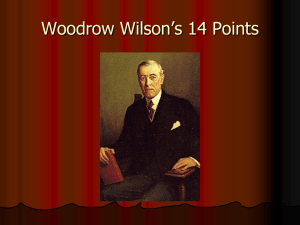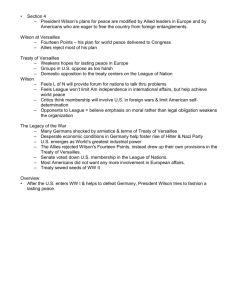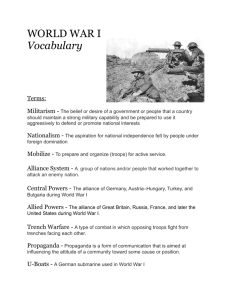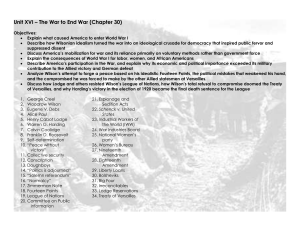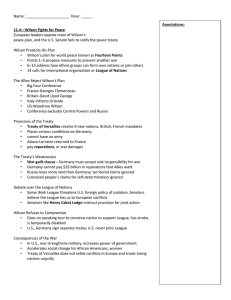Treaty of Versailles US
advertisement
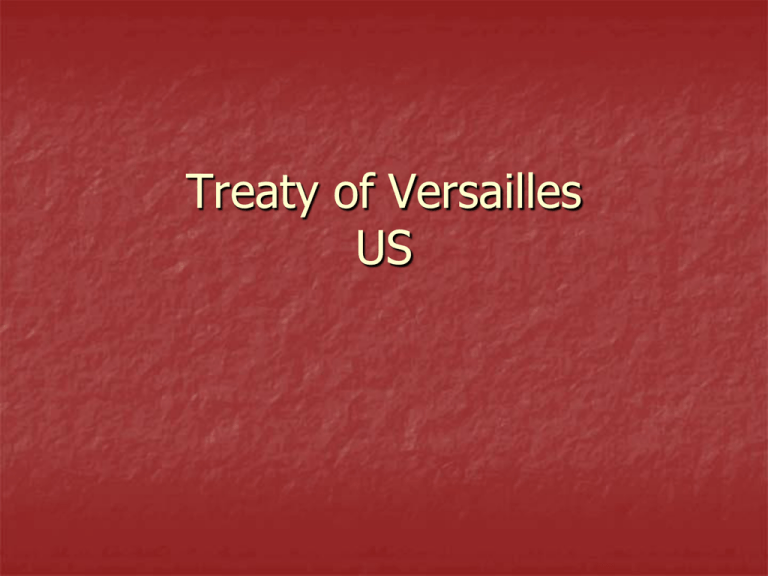
Treaty of Versailles US Preview What should happen when a country is defeated in a war? Should they be punished? What would be good about punishing them? What would be bad about punishing them? Woodrow Wilson and the US He was very idealistic. He thought he could negotiate a peace settlement that would prevent future wars. Wilson’s Plan for a New World Order Wilson’s plan for peace was called the 14-Points. Some of the things it called for: Free Trade Freedom of the Seas Arms reduction An end to secret alliances *Self-Determination—the right of people to have their own countries and choose their own form of government. Breaking Up the Ottoman and AustrianHungarian Empire. NO MORE COLONIES OR EMPIRES! The League of Nations Above all, Wilson’s plan called for an international organization called the League of Nations. The League would be made up of members from all of the countries of the world and would settle disputes without war. They would also use collective security (everybody ganging up on whoever got out of line) to prevent war in the future. Wilson Arrives in Paris The Paris Peace Conference The Allies met in Paris to decide what should be done now that he war was over. Wilson represented the U.S. Georges Clemenceau represented the French. David Lloyd George the British. Vittorio Orlando = Italy. How might the British and French want a different type of peace settlement than the U.S.? What the leaders wanted Wilson wanted his 14-points. He wanted to be easy on Germany so there would be no resentment. The British and the French wanted to punish Germany and keep her weak. They also want to keep their colonies. France wants Alsace-Lorraine The Treaty of Versailles The final treaty was the Treaty of Versailles. The treaty was very harsh on the Germans. Germans were forced to say that the war was their fault. They were forced to pay large reparations (payments) to cover the destruction caused by the war and for allied soldiers pensions. The total amount was over $30-Billion They had to give up territory to France and were not allowed to have a big army or navy. They lost their colonies. (England and France kept theirs.) People in Austro-Hungarian Empire are given Self-determination. Ottoman empire broken up—League of Nations takes over their territory. The League of Nations The League of Nations was accepted. But for the US to be a part, Wilson needs to go back to the US and get Senate to approve it. Divisions at home (US) Irreconcilables —Against joining the League under any circumstances. They are traditional isolationists—believe that the US has no business in European affairs. See the League as an alliance. Mainly Republicans. Reservationists Think that the League might be Ok, but some changes are needed before they can go along. Fear that as written, the US would have no control over when its troops were sent to war. Call for Amendments that give US sole authority to send troops. Mainly Republicans and some just want to embarrass Wilson. Led by Henry Cabot Lodge. Internationalists Wilson and his supporters (mainly Democrats). They are for US to be a part of the League of Nations. Think that the US has a moral obligation to be involved in world affairs. If you keep to yourself, then you have no influence. Wilson Takes it to the People Frustrated by Senate opposition, Wilson went on nation-wide speaking tour. Has a stroke. In the end, Wilson would not make a deal with the reservationists and the US never joined the League of Nations. Review What was the name of the agreement hat ended WWI? A = Treaty of Versailles How did Wilson’s postwar vision differ from those of the British and the French? Why? What was the name of Wilson’s plan to create a new world order and prevent future wars? A = 14 points What was the name of the World Organization proposed by Wilson that was supposed to keep the peace in the post-war world? A = League of Nations. Name and describe the two groups of U.S. senators that were opposed to joining the League of Nations. A = Irreconcilables and reservationists.

